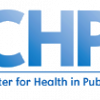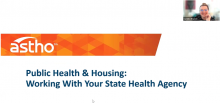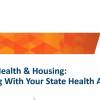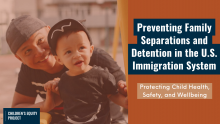0
Webinar
Community:
Nov 14, 2023
This webinar includes a discussion about innovations in trauma-informed approaches to housing from expert speakers. We heard from Julianna Stuart-Lomax presenting about the POAH Trauma-Informed Housing Toolkit and their work in this area. Chad Holtzinger, president of Shopworks Architecture and partner of the Denver Housing Authority, discussed PHA trauma-informed practices at their Thrive project.
Authored by: Housing Is Working Group
Topics: Healthy homes, Housing Is Working Group, Mental health
 Shared by Camille Anoll-Hunter
Shared by Camille Anoll-Hunter
Camille Anoll-Hunter posted a
on Nov 15, 2023
This webinar includes a discussion about innovations in trauma-informed approaches to housing from expert speakers. We heard from Julianna Stuart-Lomax presenting about the POAH Trauma-Informed Housing Toolkit and their work in this area.
0
Webinar
Community:
Sep 12, 2023
This webinar will describe new research that shows children whose families participated in a program that helped them move from distressed neighborhoods to areas with lower rates of poverty experienced significant improvements in severe asthma episodes. Before moving, for every 100 children, there were approximately 88 severe asthma attacks per year. After moving, there were approximately 40 severe attacks per year, a reduction of more than 50%. The webinar will explore factors that help explain these changes in asthma, including the critical role of neighborhood-related stress, and describes future direction and pilot programs.
The publication can be found in the Journal of the American Medical Association here: https://jamanetwork.com/journals/jama/article-abstract/2804823
Authored by: Housing Is Working Group, Johns Hopkins University researchers
Topics: Asthma, Healthy homes, Housing, Mental health, Mobility
 Shared by Camille Anoll-Hunter
Shared by Camille Anoll-Hunter
Camille Anoll-Hunter posted a
on Sep 13, 2023
Housing Is Working Group, Johns Hopkins University researchers
This webinar will describe new research that shows children whose families participated in a program that helped them move from distressed neighborhoods to areas with lower rates of poverty experienced significant improvements in severe asthma episodes.
0
Webinar
Community:
Aug 8, 2023
Building and maintaining effective community partnerships is a critical component of health center management and community involvement. Local partners help integrate important stakeholders into organizational processes and empower health centers to better understand and care for the communities they serve. But can health centers design and evaluate their partnerships? In this webinar, we reviewed tools and procedures for designing, evaluating, and strengthening community partnerships with a focus on pragmatic, practical and innovative solutions.
Authored by: National Center of Health In Public Housing
Topics: Health, Housing, Partnerships
 Shared by Camille Anoll-Hunter
Shared by Camille Anoll-Hunter
Camille Anoll-Hunter posted a
on Aug 8, 2023
National Center of Health In Public Housing
Building and maintaining effective community partnerships is a critical component of health center management and community involvement.
0
Policy Brief
Community:
Mar 1, 2023
Social service programs are often looking for ways to assess and improve program design and implementation, and are increasingly using rapid learning methods to do so. In rapid learning cycles, programs try a new approach, see how well it works, make modifications to strengthen it, and then try it again. This brief illustrates how 10 fatherhood programs used learning cycles to evaluate one of three promising approaches to engaging men in their services, and the ways they used data in the learning cycle process to make decisions about the design and implementation of the approaches. Even outside of the learning cycle framework, programs may benefit from using data and the observations and reflections of participants and staff members to guide the implementation of program elements, as is illustrated in this piece.
Authored by: Keri West, Diego Quezada, Jonny Poilpré, and Rebecca Behrmann for Manpower Demonstration Research Corporation
Topics: Family engagement, Healthy homes, Research
 Shared by Sandra Ware
Shared by Sandra Ware
Sandra Ware posted a
on Jun 8, 2023
Keri West, Diego Quezada, Jonny Poilpré, and Rebecca Behrmann for Manpower Demonstration Research Corporation
Social service programs are often looking for ways to assess and improve program design and implementation, and are increasingly using rapid learning methods to do so.
0
Policy Brief
Community:
Mar 1, 2023
This document summarizes what was learned in SIRF (Strengthening the Implementation of Responsible Fatherhood Programs), which engaged 10 programs in using learning cycles—repeated periods of implementing ideas and reflecting on the results—to build evidence on practices to improve the enrollment, engagement, and retention of fathers in fatherhood programs.
Authored by: Charles Michalopoulos and Rebecca Behrmann for Strengthening the Implementation of Responsible Fatherhood Programs
Topics: Family engagement, Research
 Shared by Sandra Ware
Shared by Sandra Ware
Sandra Ware posted a
on Jun 8, 2023
Charles Michalopoulos and Rebecca Behrmann for Strengthening the Implementation of Responsible Fatherhood Programs
This document summarizes what was learned in SIRF (Strengthening the Implementation of Responsible Fatherhood Programs), which engaged 10 programs in using learning cycles—repeated periods of implementing ideas and reflecting on the results—to build evidence on practices to improve the enrollment, e
0
Policy Brief
Community:
Mar 1, 2023
Unfortunately, there are more youth experiencing homelessness than there are resources available. Up to 40% of youth experiencing homelessness identify as lesbian, gay, bisexual, transgender, and queer/questioning (LGBTQ+). Homelessness is often the result of multiple factors including historical and present systemic racism, discrimination, and socio-economic inequities. Learn more in our new policy brief.
Authored by: National Network for Youth
Topics: Criminal justice, Homelessness, Housing, Legislation & Policy, Mental health, Racial inequalities, Safety, Stability, Youth
 Shared by Sandra Ware
Shared by Sandra Ware
Sandra Ware posted a
on Jun 8, 2023
National Network for Youth
Unfortunately, there are more youth experiencing homelessness than there are resources available. Up to 40% of youth experiencing homelessness identify as lesbian, gay, bisexual, transgender, and queer/questioning (LGBTQ+).
0
Webinar
Community:
Apr 26, 2023
Partnerships across housing, transportation, aging and disability, and health are essential to ensure housing stability. Transportation is necessary for community living. With transportation assistance, many older adults and people with disabilities can shop for groceries, get to medical appointments, stay connected and engaged, and otherwise access everyday locations and participate in their community.
Partnering to help people connect to transportation options is therefore a critical component of making community living possible.
This webinar:
Highlights effective pathways for creating cross-sector collaborations with public transportation as a key partner to improve housing stability.
Builds awareness of technical assistance resources to strengthen partnership development, including an online tool that identifies possible community transportation partners.
Answers participants’ questions about forming effective cross-sector partnerships to address housing stability through transportation access.
Authored by: Housing and Services Resource Center (HSRC)
Topics: Transportation
 Shared by Malcolm Guy
Shared by Malcolm Guy
Malcolm Guy posted a
on Apr 26, 2023
Housing and Services Resource Center (HSRC)
Partnerships across housing, transportation, aging and disability, and health are essential to ensure housing stability. Transportation is necessary for community living.
0
Webinar
Community:
Apr 13, 2023
Please join us for a time to hear from PHA leaders and industry professionals on key cross-sector topics of interest. This month will focus on strategies for working with your health department including presentations from those in the field and tips from your fellow PHAs already doing the work.
Authored by: CLPHA
Topics: Health, Housing Is Working Group, Medicaid / Medicare, Partnerships
 Shared by Sandra Ware
Shared by Sandra Ware
Sandra Ware posted a
on Apr 13, 2023
Please join us for a time to hear from PHA leaders and industry professionals on key cross-sector topics of interest. This month will focus on strategies for working with your health department including presentations from those in the field and tips from your fellow PHAs already doing the work.
0
Webinar
Community:
Apr 11, 2023
CLPHA and the U.S. Department of Energy hosted a webinar to provide PHAs with an overview of climate resiliency funds now available through the Office of State and Community Energy Programs. Dr. Henry McKoy joined the webinar and gave details on applying for various environmental resiliency funds now available.
Authored by: Malcolm Guy
Topics: Environmental Resiliency/Climate Change, Green, Sustainability
 Shared by Malcolm Guy
Shared by Malcolm Guy
Malcolm Guy posted a
on Apr 11, 2023
CLPHA and the U.S. Department of Energy hosted a webinar to provide PHAs with an overview of climate resiliency funds now available through the Office of State and Community Energy Programs. Dr.
0
Policy Brief
Community:
Mar 28, 2023
Family separations and family detention have been used as part of immigration enforcement in the United States. These practices and policies are severely detrimental to child health and wellbeing and can cause lasting harm.
This brief reviews the state of the research on the developmental, psychological, and physical toll of family separation and family detention on children and their caregivers. Grounded in this science, we provide a set of policy recommendations that protect child health and wellbeing.
Authored by: Kelly Edyburn, PhD & Shantel Meek, PhD for the Children's Equity Project
Topics: Child welfare, Early childhood, Health, Immigrants, Legislation & Policy, Mental health, Youth
 Shared by Sandra Ware
Shared by Sandra Ware
Sandra Ware posted a
on Mar 30, 2023
Kelly Edyburn, PhD & Shantel Meek, PhD for the Children's Equity Project
Family separations and family detention have been used as part of immigration enforcement in the United States.
0
Webinar
Community:
Mar 14, 2023
At the Housing Is Working Group webinar on March 14, 2023, we heard from Catherine Crago, Head of Strategic Initiatives at the Housing Authority of the City of Austin (HACA), about the importance of promoting Digital Equity within public Housing and how other public housing authorities can get involved in this work. During this presentation Catherine presented on a case study about the work that her housing authority has done and shared resources to other housing authorities interested in promoting digital equity.
Authored by: CLPHA
Topics: Housing Is Working Group
 Shared by Sandra Ware
Shared by Sandra Ware
Sandra Ware posted a
on Mar 14, 2023
https://youtu.be/2CkYXEwbXQs
At the Housing Is Working Group webinar on March 14, 2023, we heard from Catherine Crago, Head of Strategic Initiatives at the Housing Authority of the City of Austin (HACA), about the importance of promoting Digital Equity within public Housing and how other public housing authorities can get invol
0
Policy Brief
Community:
Nov 29, 2022
Successful diabetes care for vulnerable populations demands a multi-prong approach, deploying direct health interventions, medications, and support from a range of community resources to address the social determinants, which impact diabetes. This brief will highlight, through case studies and program descriptions, the important role of non-clinical staff in both the health center and housing setting to support individuals and families struggling to prevent and keep diabetes conditions under control.
Authored by: CSH
Topics: Health, Housing
 Shared by Sandra Ware
Shared by Sandra Ware
Sandra Ware posted a
on Nov 29, 2022
Successful diabetes care for vulnerable populations demands a multi-prong approach, deploying direct health interventions, medications, and support from a range of community resources to address the social determinants, which impact diabetes.
0
Webinar
Community:
Nov 8, 2022
On October 13, 2022, HHS Secretary Xavier Becerra extended the COVID-19 Public Health Emergency, effective through January 11, 2023. While when the Public Health Emergency will end is still unknown, when it does, state Medicaid and CHIP plans will begin reassessing the eligibility of all recipients to confirm they still meet the eligibility requirements (“redetermination”).
At the Housing Is Working Group webinar on November 8, 2022, we heard from UnitedHealthcare about the important actions needed to ensure individuals retain their Medicaid enrollment and how PHA staff can support residents in this process. This presentation is plan agnostic and the goal is to ensure Americans retain their Medicaid coverage regardless of the healthcare plan that serves them. This webinar is open to all interested attendees!
Authored by: Housing Is Working Group
Topics: Health, Housing Is Working Group, Medicaid / Medicare
 Shared by Camille Anoll-Hunter
Shared by Camille Anoll-Hunter
Camille Anoll-Hunter posted a
on Nov 8, 2022
On October 13, 2022, HHS Secretary Xavier Becerra extended the COVID-19 Public Health Emergency, effective through January 11, 2023.
0
Policy Brief
Community:
Nov 3, 2022
The series highlights the promising work of the EHS-CCPs to date, particularly related to pandemic recovery and stabilization, workforce support, and expanding access to holistic support for children and families, especially mental health support. The briefs highlight the many roles that states can play in establishing and expanding their own EHS-CCPs, including by using Preschool Development Grant Birth to Five funding and aligning CCDF quality funding with supports needed to establish and grow the Early Head Start model.
The EHS-CCPs take many forms in states and communities across the country, but all provide resources to child care partners to deliver high-quality services aligned with the holistic Early Head Start model. This includes ensuring access to early learning for infants and toddlers; vision, hearing and developmental screenings; connections to health supports, including mental and dental healthcare; supports for families — including connections to prenatal care and economic, education, housing, and health supports; and coaching and access to credentials and higher levels of education for the workforce. In some states, the EHS-CCPs have prompted important policy changes that align standards across these two programs, reducing the burden for communities and providers.
Check out the full series here and help us spread the word!
Authored by: Mario Cardona, Shantel Meek, Linda Smith, Yvette Fuentes, and Eric Bucher for Arizona State University Center for Child and Family Success
Topics: Child welfare, COVID-19, Health, Mental health, Workforce development
 Shared by Sandra Ware
Shared by Sandra Ware
Sandra Ware posted a
on Nov 3, 2022
Mario Cardona, Shantel Meek, Linda Smith, Yvette Fuentes, and Eric Bucher for Arizona State University Center for Child and Family Success
The series highlights the promising work of the EHS-CCPs to date, particularly related to pandemic recovery and stabilization, workforce support, and expanding access to holistic support for children and families, especially mental health support.
0
Policy Brief
Community:
Sep 28, 2022
Approximately one in five adults reported experiencing household food insecurity in both spring 2020 and again in summer 2022, after a decline in reported food insecurity in spring 2021. High food price inflation, along with elevated costs for other basic needs, such as transportation and rent, have likely eroded food budgets in the last year. In addition, some of the safety net responses that buffered food insecurity in 2021 are no longer in place. In this brief, we use data from the Health Reform Monitoring Survey, a nationally representative survey of nonelderly adults, to assess food insecurity among households with nonelderly adults in March/April 2020, April 2021, and June 2022.
Authored by: Elaine Waxman, Julio Salas, Poonam Gupta, Michael Karpman for the Urban Institute
Topics: Food insecurity, Research, Stability
 Shared by Sandra Ware
Shared by Sandra Ware
Sandra Ware posted a
on Oct 27, 2022
Elaine Waxman, Julio Salas, Poonam Gupta, Michael Karpman for the Urban Institute
Approximately one in five adults reported experiencing household food insecurity in both spring 2020 and again in summer 2022, after a decline in reported food insecurity in spring 2021.
0
Policy Brief
Community:
Oct 12, 2022
Disabled individuals and families in federally assisted housing face multiple challenges in gaining access to housing units and services that meet their needs—despite legal frameworks meant to help them. This brief focuses on working-age disabled individuals and families with a disabled household member who live in federally assisted housing. It presents evidence of the challenges with federally assisted housing processes and supports for residents with disabilities, and provides recommendations that could help these processes and supports better meet legal obligations and resident needs.
Authored by: Corianne Payton Scally, Ebonie Megibow, Susan J. Popkin for the Urban Institute
Topics: Disabilities, Family engagement, Housing
 Shared by Sandra Ware
Shared by Sandra Ware
Sandra Ware posted a
on Oct 27, 2022
Corianne Payton Scally, Ebonie Megibow, Susan J. Popkin for the Urban Institute
Disabled individuals and families in federally assisted housing face multiple challenges in gaining access to housing units and services that meet their needs—despite legal frameworks meant to help them.
0
Webinar
Community:
Sep 13, 2022
View this webinar to learn more about actions public housing authorities can take to promote environmental resiliency in their communities. We first heard from Natalie Hildt Treat, senior policy advisor for Building Electrification Initiative at Northeast States for Coordinated Air Use Management (NESCAUM). Treat discussed NESCAUM’s efforts in the field of environmental resiliency, including her work helping states harness the power of clean, efficient electric building technologies to meet their climate and air quality goals. Next, we heard a case study about how the Municipal Housing Authority for the City of Yonkers (MHACY) has worked with their partner, Groundwork Hudson Valley, to incorporate environmental resiliency into their neighborhoods. Wilson Kimball, president and CEO of MHACY, and Brigitte Griswold, executive director of Groundwork Hudson Valley, shared how their partnership has leveraged data to understand the most vulnerable areas in their communities and address flooding and urban heat concerns.
Authored by: Housing Is
Topics: Energy, Environmental Resiliency/Climate Change, Green, Healthy homes, Housing Is Working Group, Sustainability
 Shared by Camille Anoll-Hunter
Shared by Camille Anoll-Hunter
Camille Anoll-Hunter posted a
on Sep 14, 2022
View this webinar to learn more about actions public housing authorities can take to promote environmental resiliency in their communities.
0
Webinar
Community:
Dec 14, 2021
At its December 2021 meeting, CLPHA's Housing Is Working Group learned from experts in the field about how they have worked to create resident-focused and community-centered work with their PHAs and partners. We also brainstormed how best to support residents and work towards more equitable and representative housing for everyone, and left with the knowledge of how to better highlight and prioritize resident voices and leadership at every level of our work.
Authored by: Housing Is
Topics: Family engagement, Health, Healthy homes, Housing, Housing Is Working Group, Mental health, Racial inequalities, Supportive housing
 Shared by Stephanie Gray
Shared by Stephanie Gray
Stephanie Gray posted a
on Apr 18, 2022
At its December 2021 meeting, CLPHA's Housing Is Working Group learned from experts in the field about how they have worked to create resident-focused and community-centered work with their PHAs and partners.
0
Webinar
Community:
Feb 8, 2022
The Housing Is team will be joined by staff from the Department of Education and Department of Housing and Urban Development to discuss evaluation considerations and best practices when evaluating multi-sector, community-based interventions such as the Promise and Choice Neighborhoods Initiatives. They will examine how they chose outcomes to track and how they set goals for the Promise and Choice Neighborhood Initiatives. They will also reflect on evaluation design considerations for these multifaceted programs.
Authored by: Housing Is
Topics: Data sharing, Education, Metrics
 Shared by Stephanie Gray
Shared by Stephanie Gray
Stephanie Gray posted a
on Apr 18, 2022
The Housing Is team will be joined by staff from the Department of Education and Department of Housing and Urban Development to discuss evaluation considerations and best practices when evaluating multi-sector, community-based interventions such as the Promise and Choice Neighborhoods Initiatives.
0
Webinar
Community:
Jan 19, 2022
Announced as part of Biden-Harris Administration’s Maternal Health Call to Action, CLPHA held a special Martin Luther King Jr. Day event on the intersection of racial inequities, housing insecurity, and maternal health outcomes. This hour-long webinar includes presentations and discussions on this topic, and how we as a society can move forward to address these inequities.
Authored by:
Topics: Child welfare, Early childhood, Health, Pre-natal, Racial inequalities
 Shared by Kirsten Greenwell
Shared by Kirsten Greenwell
Kirsten Greenwell posted a
on Jan 19, 2022
Announced as part of Biden-Harris Administration’s Maternal Health Call to Action, CLPHA held a special Martin Luther King Jr. Day event on the intersection of racial inequities, housing insecurity, and maternal health outcomes.
0
Webinar
Community:
Aug 24, 2021
Community Health Workers (CHWs) are taking a larger role in patient-centered care and community health. Yet, questions remain around the scope of their work, licensure requirements, and available funding sources to build a capable workforce. In this webinar, we will clarify their work and explore their role in advancing equity. We will hear from Ashley Rodriguez, chair of the American Public Health Association’s Community Health Worker Section. Rodriguez is leading national efforts to promote CHWs’ work and support their professional development. Jenna Grant, a resource development manager with the Tulsa Health Department, will share examples of CHW equity-building work in Oklahoma, including the recent CHW-led movement to gain certification for a sustainable workforce. This webinar will be especially helpful for those seeking strategies to strengthen CHWs’ capacity to build equity in communities.
Authored by: County Health Rankings & Roadmaps
Topics: Health, Preventative care
 Shared by Camille Anoll-Hunter
Shared by Camille Anoll-Hunter
Camille Anoll-Hunter posted a
on Aug 26, 2021
County Health Rankings & Roadmaps
Community Health Workers (CHWs) are taking a larger role in patient-centered care and community health. Yet, questions remain around the scope of their work, licensure requirements, and available funding sources to build a capable workforce.
0
Webinar
Community:
Jul 30, 2021
This webinar encouraged HUD staff and stakeholders to learn how public health data sharing agreements can better inform on-the-ground vaccine efforts.
Authored by: HUD Exchange
Topics: COVID-19, Data sharing, Health
 Shared by Kirsten Greenwell
Shared by Kirsten Greenwell
Kirsten Greenwell posted a
on Jul 30, 2021
This webinar encouraged HUD staff and stakeholders to learn how public health data sharing agreements can better inform on-the-ground vaccine efforts.
0
Policy Brief
Community:
Jun 30, 2021
Every child in an early childhood setting should have a teacher with specialized education to promote that child’s cognitive, social, emotional, and physical development and who prepares them for success in school and in life. The National Research Council’s report from a panel of experts, Transforming the Workforce for Children Birth Through Age 8: A Unifying Foundation, lays out several recommendations for programs serving children from birth through age 8, notably that teachers "should have at a minimum a bachelor’s degree and specialization in the knowledge and competencies needed to serve as a care and education professional.
Authored by: Child Care Services Association & T.E.A.C.H.
Topics: Early childhood, Education, Post-secondary
 Shared by Kirsten Greenwell
Shared by Kirsten Greenwell
Kirsten Greenwell posted a
on Jun 30, 2021
Child Care Services Association & T.E.A.C.H.
Every child in an early childhood setting should have a teacher with specialized education to promote that child’s cognitive, social, emotional, and physical development and who prepares them for success in school and in life.
0
Policy Brief
Community:
May 5, 2021
In March 2020, the COVID-19 pandemic forced many public housing authorities (PHAs) to quickly adjust their operational procedures to protect their staff while providing emergency assistance to residents. Many PHAs had to close their offices and convert to remote operations almost overnight, while staff focused on supporting their tenants by delivering them food, doing wellness checks for vulnerable residents, and ensuring they had access to and in some cases providing the technology needed for children to attend school remotely and isolated residents to remain connected to friends, family, and service providers. Moreover, as the economic crisis caused by the pandemic worsened, PHAs were under pressure to rapidly adjust rents for tenants who had lost income and process housing choice voucher (HCV) applications so people could use their vouchers to find housing. This brief provides insights into how public housing authorities used additional flexibilities that became available through a series of HUD-issued regulatory and statutory waivers, and makes the case for the potential benefits for added flexibilities for the HCV and public housing programs going forward.
Authored by: Monique King-Viehl, Elizabeth Champion, & Susan J. Popkin for URBAN INSTITUTE
Topics: Advocacy, COVID-19, Data sharing, Health, Housing, Safety, Supportive housing
 Shared by Housing Is
Shared by Housing Is
Housing Is posted a
on May 25, 2021
Monique King-Viehl, Elizabeth Champion, & Susan J. Popkin for URBAN INSTITUTE
In March 2020, the COVID-19 pandemic forced many public housing authorities (PHAs) to quickly adjust their operational procedures to protect their staff while providing emergency assistance to residents.
0
Policy Brief
Community: Postsecondary
Nov 1, 2020
Colleges support students with advising, counseling, or coaching in academics and other skills they need to succeed in school. Some colleges enhance those services through reduced adviser caseloads and more comprehensive, frequent guidance, which can improve students’ semester-to-semester retention and average credits earned. This overview describes important lessons on designing and implementing those services. College leaders and administrators committed to designing, building, managing, and continually supporting enhanced advising services can consult this checklist of recommendations as they redesign or enhance these services — as stand-alone services or as part of multifaceted interventions.
Authored by: Andrea Vasquez & Susan Scrivener for MDRC
Topics: Attendance, Child welfare, Community development, Education, Grade-level proficiency, Post-secondary, Workforce development
 Shared by Housing Is
Shared by Housing Is
Housing Is posted a
on Mar 4, 2021
Andrea Vasquez & Susan Scrivener for MDRC
Colleges support students with advising, counseling, or coaching in academics and other skills they need to succeed in school.
 Shared by Camille Anoll-Hunter
on Nov 15, 2023
Shared by Camille Anoll-Hunter
on Nov 15, 2023
 Shared by Camille Anoll-Hunter
on Sep 13, 2023
Shared by Camille Anoll-Hunter
on Sep 13, 2023

 Shared by Camille Anoll-Hunter
on Aug 8, 2023
Shared by Camille Anoll-Hunter
on Aug 8, 2023


 Shared by Sandra Ware
on Jun 8, 2023
Shared by Sandra Ware
on Jun 8, 2023


 Shared by Sandra Ware
on Jun 8, 2023
Shared by Sandra Ware
on Jun 8, 2023


 Shared by Sandra Ware
on Jun 8, 2023
Shared by Sandra Ware
on Jun 8, 2023

 Shared by Malcolm Guy
on Apr 26, 2023
Shared by Malcolm Guy
on Apr 26, 2023

 Shared by Sandra Ware
on Apr 13, 2023
Shared by Sandra Ware
on Apr 13, 2023

 Shared by Malcolm Guy
on Apr 11, 2023
Shared by Malcolm Guy
on Apr 11, 2023

 Shared by Sandra Ware
on Mar 30, 2023
Shared by Sandra Ware
on Mar 30, 2023

 Shared by Sandra Ware
on Mar 14, 2023
Shared by Sandra Ware
on Mar 14, 2023
 Shared by Sandra Ware
on Nov 29, 2022
Shared by Sandra Ware
on Nov 29, 2022
 Shared by Camille Anoll-Hunter
on Nov 8, 2022
Shared by Camille Anoll-Hunter
on Nov 8, 2022
 Shared by Sandra Ware
on Nov 3, 2022
Shared by Sandra Ware
on Nov 3, 2022
 Shared by Sandra Ware
on Oct 27, 2022
Shared by Sandra Ware
on Oct 27, 2022
 Shared by Sandra Ware
on Oct 27, 2022
Shared by Sandra Ware
on Oct 27, 2022
 Shared by Camille Anoll-Hunter
on Sep 14, 2022
Shared by Camille Anoll-Hunter
on Sep 14, 2022
 Shared by Stephanie Gray
on Apr 18, 2022
Shared by Stephanie Gray
on Apr 18, 2022
 Shared by Stephanie Gray
on Apr 18, 2022
Shared by Stephanie Gray
on Apr 18, 2022
 Shared by Kirsten Greenwell
on Jan 19, 2022
Shared by Kirsten Greenwell
on Jan 19, 2022
 Shared by Camille Anoll-Hunter
on Aug 26, 2021
Shared by Camille Anoll-Hunter
on Aug 26, 2021
 Shared by Kirsten Greenwell
on Jul 30, 2021
Shared by Kirsten Greenwell
on Jul 30, 2021
 Shared by Kirsten Greenwell
on Jun 30, 2021
Shared by Kirsten Greenwell
on Jun 30, 2021
 Shared by Housing Is
on May 25, 2021
Shared by Housing Is
on May 25, 2021
 Shared by Housing Is
on Mar 4, 2021
Shared by Housing Is
on Mar 4, 2021



